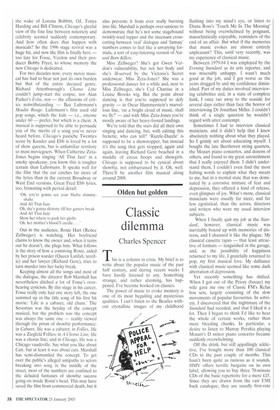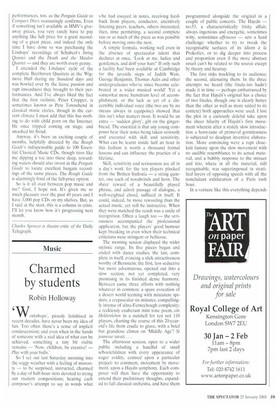Classic dilemma
Charles Spencer
This is a column in crisis, My brief is to write about the popular music of the past half century, and during recent weeks I have hardly listened to any. Something strange, and rather alarming, has happened. I've become hooked on classics.
The power of music to evoke memory is one of its most beguiling and mysterious qualities. I can't listen to the Beatles without crystalline images of my childhood
flashing into my mind's eye, or listen to Diana Ross's 'Touch Me In The Morning' without being overwhelmed by poignant, masochistically enjoyable, reminders of the end of an affair. But what if the memories that music evokes are almost entirely unpleasant? This, until very recently, was my experience of classical music.
Between 1979-84 I was employed by the Evening Standard as its arts reporter, and was miserably unhappy. I wasn't much good at the job, and I got worse as the years dragged by and my confidence diminished. Part of my duties involved interviewing celebrities and, in a state of complete funk, I once ran away to the seaside for several days rather than face the horror of interviewing Dr Jonathan Miller. I couldn't think of a single question he wouldn't regard with utter contempt.
Sometimes I had to interview classical musicians, and it didn't help that I knew absolutely nothing about what they played. So I grimly set about educating myself. I bought the late Beethoven string quartets, the Mozart piano concertos, and dozens of others, and found to my great astonishment that I really enjoyed them. I didn't understand them, I couldn't even find the most halting words to explain what they meant to me, but in a mental state that was dominated by a corrosive mixture of fear and depression, they offered a kind of release, even glimpses of joy. What's more, classical musicians were usually far nicer, and far less egotistical, than the actors, directors and writers who were my usual interview subjects.
When I finally quit my job at the Standard, however, classical music was inevitably bound up with memories of distress, and I shunned it like the plague. My classical cassette tapes — that least attractive of formats — languished in the garage, and, as the possibility of happiness returned to my life, I gratefully returned to pop, my first musical love. My dalliance with classical music seemed like some dark aberration of depression.
Yet recently something has shifted. When I got out of the Priory (booze) my wife gave me one of Classic FM's Relax box sets, largely consisting of the slow movements of popular favourites. In sobriety, I discovered that the nightmare of the Standard had receded, and that I liked it a lot. Then I began to think I'd like to hear the whole of certain works, rather than mere bleeding chunks. In particular, a desire to listen to Murray Perahia playing Mozart's D minor piano concerto became suddenly overwhelming.
Off the drink, but still appallingly addictive, I've bought more than 100 classical CDs in the past couple of months. This hasn't been quite as ruinous as it sounds. HMV offers terrific bargains on its own label, allowing you to buy three 70-minute CDs of the basic repertoire for a mere £15. Since they are drawn from the vast EMI back catalogue, they are usually first-rate performances, too, as the Penguin Guide to Compact Discs reassuringly confirms. Even if something isn't available at HMV's giveaway prices, you very rarely have to pay anything like full price for a great recording of a great piece, and indeed the only time I have done so was purchasing the Lindsays' recordings of Schubert's String Quintet and the Death and the Maiden Quartet — and they are worth every penny.
I attended the Lindsays' cycle of the complete Beethoven Quartets at the Wigmore Hall during my Standard days and was bowled over by the fierce passion and rapt inwardness they brought to their performances, And I've always liked the fact that the first violinist, Peter Cropper, is sometimes known as Pete Townshend in classical music circles, though in the current climate I must add that this has nothing to do with child porn on the Internet. He once tripped coming on stage, and smashed his Strad.
Anyway, it's been an exciting couple of months, helpfully directed by the Rough Guide's indispensable guide to 100 Essential Classical Music CDs, though tiros like me dipping a toe into these deep, rewarding waters should also invest in the Penguin Guide to locate excellent bargain recordings of the same pieces. The Rough Guide is alarmingly fond of the full-price option.
So is it all over between pop music and me? God, I hope not, It's given me so much pleasure over the past 40 years and I have 3.000 pop CDs on my shelves. But, as I said at the start, this is a column in crisis, let you know how it's progressing next month.
Charles Spencer is theatre critic of the Daily Telegraph.



















































































 Previous page
Previous page